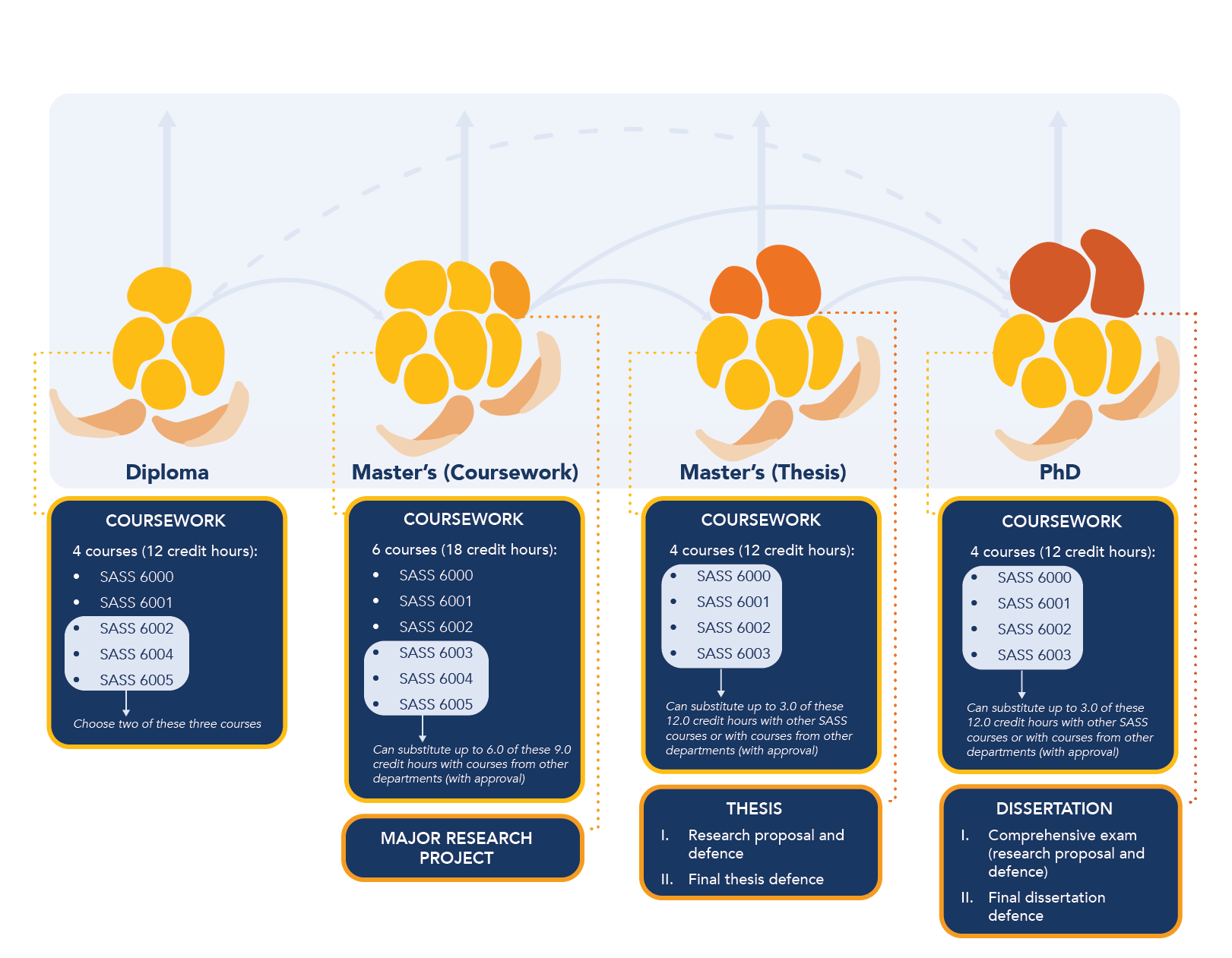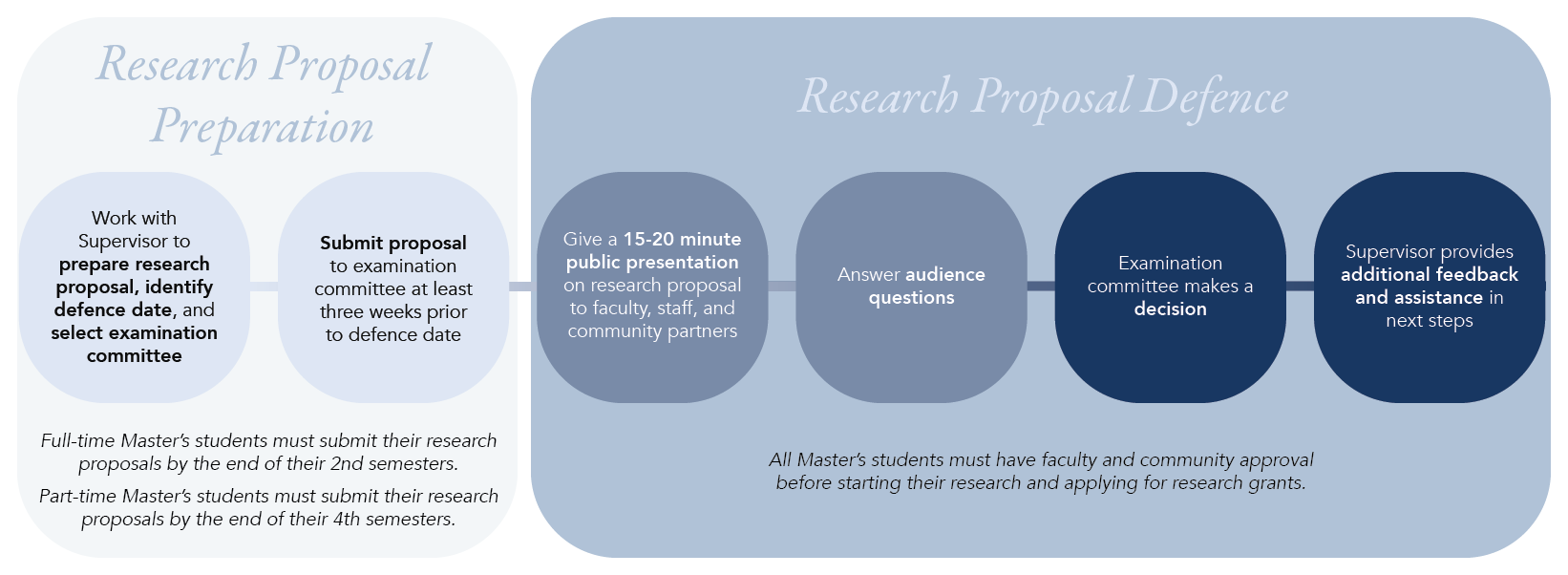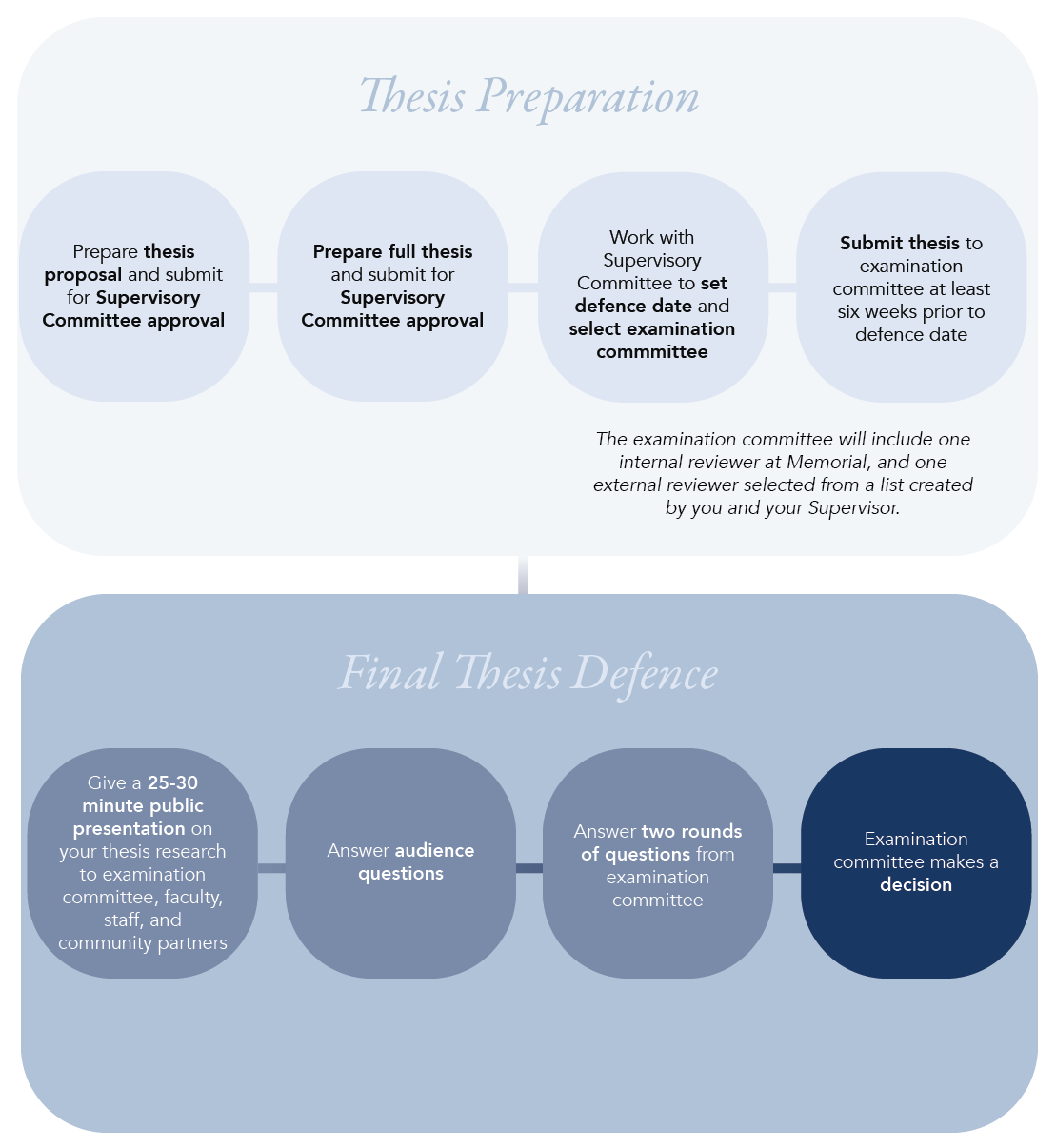Graduate Degrees in Arctic & Subarctic Futures
 (2).png)
Overview
The School of Arctic and Subarctic Studies at the Labrador Campus offers a suite of graduate program pathways in Arctic and Subarctic Futures, including Master’s (coursework), Master’s (thesis), PhD, and Diploma options.
Studying at the Labrador Campus in Happy Valley-Goose Bay, Labrador, provides the rare and unique opportunity to pursue graduate education and research immersed in a stunning Northern location, studying at a Northern-led and Indigenous-focused campus, connecting with and learning from Innu and Inuit lands and cultures, and working closely with an interdisciplinary group of faculty, researchers, Indigenous leaders, Elders, communities, and organizations.
For a quick overview of the Arctic and Subarctic Futures program, check out our brochure: Arctic & Subarctic Futures Graduate Program Brochure
For more detailed information on the program, click on the sub-headings below to expand each section.

What to expect...
This program begins in the spring semester (each May), to allow for an exploration of academic, cultural, and personal learning across all seasons in Labrador. Throughout your time at the Labrador Campus, you will develop skills in critical thinking and writing, community-led research methodologies and approaches, interdisciplinary knowledge integration, and leadership.
You will become part of a network of learners and leaders who will contribute to Northern social, cultural, and economic growth, development, and prosperity and support healthy and flourishing futures.
Students pursuing graduate studies at the Labrador Campus in Happy Valley-Goose Bay will develop skills in critical thinking and writing, community-led research methodologies and approaches, interdisciplinary knowledge integration, and leadership. Graduates from this program will be well-trained to pursue diverse career paths, particularly in Northern locations and for Northern-focused and Northern-led organizations, including in government (Indigenous, municipal, provincial, territorial, federal), academia, business and industry, and the not-for-profit sectors.
Government and Non-Governmental Agencies:
Graduates of the Arctic and Subarctic Futures program are highly qualified for working in Indigenous, municipal, provincial, territorial, and federal government agencies, as well as non-governmental organizations.
Industry, Business, & Services:
Graduates from this program have employment opportunities in leadership roles in a range of industries and service areas in and serving the North, including businesses, research firms, legal work, and consultancies.
Academia, Research, and Consultancy:
Graduates of the Arctic and Subarctic Futures will be qualified to pursue positions in academia, research, and consultancy in a diversity of disciplines. Additionally, graduates are qualified to work in a variety of positions within universities and colleges, including as faculty, researchers, staff, and instructors.

Courses and program requirements
Each of the pathways of the Arctic and Subarctic Futures program has different requirements. There are six courses associated with this graduate offering, which can be taken in various combinations to achieve different learning pathways.
While the six courses are part of all pathways and the content remains the same for each level, the expectations for course assignments and student performance will differ depending on the program in which the student is registered.
Core courses:
The six core courses are designed to build on and complement one another, creating interconnected and interdisciplinary learning opportunities while setting the foundations for strong Indigenous-led and Northern-focused research.
Several of these courses require land-based intensives in Labrador, and will follow non-traditional semester pathways to incorporate seasonal and environmental learning throughout the curriculum.
- SASS 6000: Learning Labrador (3.0 credit hours) engages participants in the critical study of Innu, Inuit, and western knowledges and histories in what is now known as Labrador. This course is a combination of in-person intensives and virtual learning opportunities, taking place in the summer semester (starting in May).
- SASS 6001: People, Place, and Identity (3.0 credit hours) is an experiential and land-based course that examines how human identity is intricately intertwined with aspects of place in Arctic and Subarctic contexts. This course is structured to take place over three seasonally-based in-person weekend intensives, over 3 different semesters.
- SASS 6002: Indigenous and Northern-Led Theories and Methodologies (3.0 credit hours) is an Indigenous-led research methodologies course that provides an opportunity to explore strength-based, Indigenous- and Northern-led theories and methodologies. This course is virtual, and structured over a full semester in the Fall semester.
- SASS 6003: Developing Research Partnerships in Arctic and Subarctic Contexts (3.0 credit hours) an applied seminar-style course aimed at providing opportunities to develop research skills and research proposals, working with community partners. This course will be delivered over two semesters in a virtual part-time format.
- SASS 6004: Arctic and Subarctic Indigenous Legal Traditions and Advocacy (3.0 credit hours) is an experiential and land-based course examining Arctic and Subarctic legal traditions and how they can be applied during times of transitioning to self-governance and practicing self-determination. This course is a combination of in-person intensives and virtual learning opportunities.
- SASS 6005: Systems for Health and Wellness in the Circumpolar North (3.0 credit hours) examines the key issues in health policy, health system governance, and health equity in the Circumpolar North. This course is virtual, and structured over a full semester.
Several of these courses require land-based intensives in Labrador, and will follow non-traditional semester pathways to incorporate seasonal and environmental learning throughout the curriculum.
Below is a visual representation of the timing of the Arctic and Subarctic Futures graduate program course offerings. Note that the large dots indicate the courses that are offered over three seasonally-based weekend intensives.
You can download this visual using the following link: Sample SASS Courses Timeline.

Specific requirements for each program pathway:
The Arctic and Subarctic Futures graduate program pathways include Master’s (coursework), Master’s (thesis), PhD, and Graduate Diploma. Part-time and full-time options are available for all pathways.
Below is a visual representation of all program pathways, including potential pathways between programs.
You can download this visual using the following link: Requirements for the Arctic and Subarctic Futures Graduate Program.

Detailed requirements for each program pathway are as follows:
The Master’s (coursework) option would normally require students to complete all six courses associated with the program, as well as a major project option, which directly responds to Northern- and Indigenous-led research priorities and works in partnership with Northern and Indigenous governments, organizations, communities, and leaders.
Students can substitute up to 6 credit hours from other departments, subject to program coordinator approval, excluding substitutions for SASS 6000, 6001, and 6002, which are mandatory for all students. Students can complete this stream through full-time or part-time studies.
- SASS 6000: Learning Labrador (mandatory)
- SASS 6001: People, Place, and Identity (mandatory)
- SASS 6002: Indigenous and Northern-Led Theories and Methodologies (mandatory)
- SASS 6003: Developing Research Partnerships in Arctic and Subarctic Studies OR a graduate-level elective in a cognate area, subject to program coordinator approval
- SASS 6004: Arctic and Subarctic Indigenous Legal Traditions and Advocacy
- SASS 6005: Systems for Health and Wellness in the Circumpolar North
Courses:
This pathway would normally require students to take (at least) four courses, including:
- SASS 6000: Learning Labrador
- SASS 6001: People, Place, and Identity
- SASS 6002: Indigenous and Northern-Led Theories and Methodologies
- SASS 6003: Developing Research Partnerships in Arctic and Subarctic Contexts
Students can substitute up to 3 credit hours from other SASS graduate courses (e.g. SASS 6004 and SASS 6005) or another department with program coordinator approval and suitable rationale. Students may also be required by their Supervisor and Supervisory Committee to take additional courses.
Supervisor and Supervisory Committee meetings:
At the beginning of the program, students will be provided with a Supervisor, who
will work closely with them throughout their graduate program, and will support them in their academic journey. Please note that students should reach out to potential supervisors well in advance of beginning their programs.
Students and supervisors will work together to identify a Supervisory Committee. Students must hold one supervisory committee meeting each semester, with the first one commencing within 4 months of beginning the program.
Research proposal and defence:
Master’s thesis students must complete and publicly defend a research proposal under the direction of their Supervisory Committee and research partners.
Students in the full-time stream must submit a research proposal to their committee by the end of the 2nd semester of their program, which reflects community priorities and partnerships and is publicly defended and evaluated by academic and community peer reviewers. Students in the part-time stream must submit a research proposal and follow the aforementioned process to their committee by the end of the 4th semester of their program.
Below is a visual representation of preparing and defending a research proposal. You can download this visual using the following link: Masters thesis research proposal and defence.

Final thesis preparation and defence:
Students must also work in partnership on their Master’s research and complete and publicly defend a thesis project under the direction of their Supervisory Committee and community partners. Each student in this stream will also present their thesis proposal publicly to a group of academics and community partners.
Students must conduct research that meets identified needs and priorities in Labrador or throughout the North, and works in partnership with Northern and Indigenous governments, organizations, communities, and leaders. All students within the Master’s thesis program will follow the rules and regulations of the School of Graduate Studies.
Below is a visual representation of preparing and defending a Master's thesis. You can download this visual using the following link: Masters thesis final defence.

The PhD Program in Arctic and Subarctic Futures normally requires the completion of coursework:
- SASS 6000: Learning Labrador
- SASS 6001: People, Place, and Identity
- SASS 6002: Indigenous and Northern-Led Theories and Methodologies
- SASS 6003: Developing Research Partnerships in Arctic and Subarctic Contexts
Students can substitute up to 3 credit hours from other SASS graduate courses (e.g. SASS 6004 and SASS 6005) or another department with program coordinator approval and suitable rationale. If a student has come through the Masters options in Arctic and Subarctic Futures, all required courses will be waived unless the student did not complete SASS 6003: Developing Research Partnerships in Arctic and Subarctic Studies, in which case this course will be required coursework. Depending on the student's background and proposed research, students may also be required by their Supervisor and Supervisory Committee to take additional courses.
The supervisor and student must hold one supervisory committee meeting each semester, with the first one commencing within 4 months of beginning the program. All students within the PhD program will follow the rules and regulations of the School of Graduate Studies.
Students must complete a comprehensive examination process, including written and oral components, to demonstrate breadth and depth of knowledge in the field(s) of research. Normally, this shall be completed by the end of the 4th semester of full-time studies (no later than semester 6), or 8th semester of part-time studies (no later than semester 12). All students must demonstrate that their research is in direct response to Indigenous and Northern-identified priorities and is working in direct partnership with Indigenous and Northern governments, organizations, communities, and leaders.
Students must have a research proposal approved by the committee, project partners, and publicly presented to and approved by both academics and community partners before research can commence, normally by the end of the 5th semester of full-time studies or the 10th semester of part-time studies.
Students must complete a dissertation project which will be publicly defended in front of academics and community partners. Students will usually complete all PhD requirements within four years (12 semesters) of enrolling in the program full time, or 8 years (24 semesters) part-time.
Learners can also access graduate courses and receive a graduate diploma, which can be used as stand-alone credentials or contribute towards the eventual completion of a Master’s (coursework or thesis) or PhD program in Arctic and Subarctic Futures.
Students who complete the graduate diploma can apply to enter into the Master’s course work or Master’s thesis streams, and would need to complete all additional course- and research-related requirements.
The graduate diploma pathway allows for ‘no-traditional’ entry into graduate programs for learners who have not started and/or completed an undergraduate degree, but have significant and relevant lived experience, Indigenous knowledge, and/or professional contributions to warrant entry into the graduate diploma. In exceptional circumstances, students who complete the graduate diploma can apply for direct entry to the PhD program and must then complete all PhD courses and research requirements. The graduate diploma requires the completion of four courses, including:
- SASS 6000: Learning Labrador
- SASS 6001: People, Place, and Identity
And two additional courses from:
- SASS 6002: Indigenous and Northern-Led Theories and Methodologies
- SASS 6004: Arctic and Subarctic Indigenous Legal Traditions and Advocacy
- SASS 6005: Systems for Health and Wellness in the Circumpolar North
This graduate diploma option is created at the direct request of people in Labrador and across the North who are looking for flexible options to enhance professional and personal learning that can be taken as stand-alone credentialling or used to continue to further graduate education, including for people who have not previously had the opportunity to complete an undergraduate degree but are well-suited and looking for graduate learning opportunities.
Who can apply?
The graduate programs in Arctic and Subarctic Futures are open to all applicants, with preference given to students from Labrador and other parts of the Circumpolar North.
There are several admission pathways for interested applicants for the graduate programs, depending on whether they are pursuing the Master’s, PhD, or Diploma options.
While normally an undergraduate degree is required for entrance to graduate studies, consideration of prior learning, professional background, and lived and cultural experiences will be considered for acceptance. Minimum admission requirements for each program pathway are as follows:
- Master's (coursework): Bachelor’s degree (minimum second class) in a relevant area of study OR some combination of educational, personal, professional, and cultural experience aligned with the program and proposed area for the major project.
- Master's (thesis): Bachelor’s degree (minimum second class) in a relevant area of study OR some combination of educational, personal, professional, and cultural experience aligned with the program and proposed area for the major project
- PhD: Master’s degree in a relevant area of study and an excellent academic record OR 12 months in a Master’s program and demonstration of exceptional ability to pursue research at the doctoral level OR Bachelor’s degree with honours (or equivalent) and 5 years of related full-time professional experience OR some combination of educational, personal, professional, and cultural experience aligned with the program and proposed research area (with permission).
- Graduate Diploma: Bachelor’s degree (minimum second class) in a relevant area of study OR some combination of educational, personal, professional, and cultural experience relevant to the program.
To prepare your application, you will require official transcript(s) from past universities (if applicable), two letters of appraisal, and a non-refundable application fee. Specific application requirements for each program pathway are as follows:
Master’s and PhD Programs:
- Curriculum Vitae (CV) outlining academic, professional, and personal experiences.
- Most recent transcripts (e.g. graduate, undergraduate).
- 2 letters of reference (1 from an academic source; 1 from a professional or community source).
- 1-page summary outlining your interest in the program and potential research focus, including commitments to working with Northern communities, governments, and/or organizations.
- 1 sole-authored or first-authored writing sample (e.g. academic, report, policy, or creative.
If you are interested in applying for the Master's or PhD program pathway, please use the following template for guidance and helpful tips on preparing your summary of research interests: Template: Preparing Your Summary of Research Interests
Diploma Program:
- Curriculum Vitae (CV) outlining academic, professional & personal experiences
- Most recent transcripts, if applicable (e.g. graduate, undergraduate).
- 2 letters of reference (1 from an academic source; 1 from a professional or community source).
Admission to the Arctic and Subarctic Futures program is competitive. Before applying, potential students should become familiar with the following information:
- Memorial University School of Graduate Studies general information
- Memorial University School of Graduate Studies application information
Applications for all programs and streams are due November 1st of each year. To apply, visit the School of Graduate Studies website to find the electronic application form.
We encourage applicants from a variety of backgrounds and with diverse disciplinary interests who are interested in living and studying in the North, and conducting research that directly responds to Northern needs and priorities.
Applicants interested in the Master’s thesis or PhD options should contact potential supervisors with whom they may be interested in working well in advance of their application to discuss potential research ideas and supervisory availability.
Further information can be obtained from Become a Graduate Student.
Announcements of funded graduate student opportunities will be posted on the Labrador Campus homepage.
Applicants interested in the Master's coursework, Master's thesis, or PhD options should use the following template to prepare their summary of research interests: Template: Preparing Your Summary of Research Interests.
Program guidance
Interested students can connect with the following people for more information:
- Dean (Interim), School of Arctic and Subarctic Studies: Dr. Sylvia Moore (deanofsass@mun.ca)

